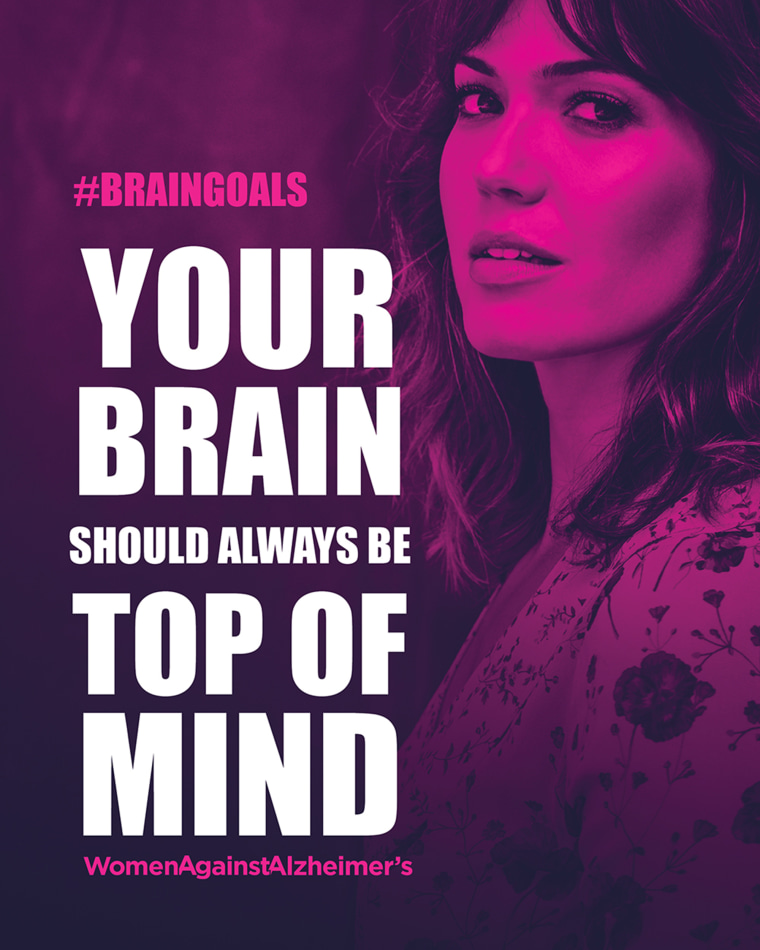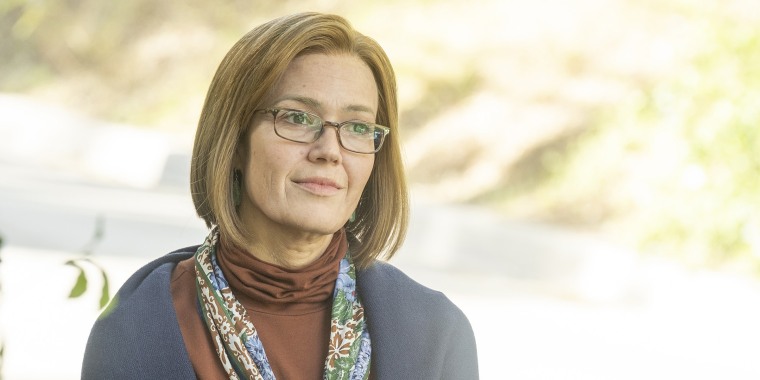Mandy Moore is taking on a new role that is close to her trademark one.
Moore has been named ambassador to the Be Brain Powerful campaign, an undertaking by the research and support organization Us Against Alzheimer’s that seeks to help women take ownership of their brain health.
It’s a good fit for the Emmy-nominated actor. On NBC’s “This Is Us,” she plays Rebecca, the matriarch of the Pearson family whose health took center stage last season when a doctor told her that her mild cognitive impairment was most likely a sign that she was in the early stages of Alzheimer’s. Her health has been a central plot point since.

“I can’t tell you the reaction that we’ve received since this storyline took foot last season,” Moore told TODAY. “People really, they see themselves, they see their parents, they see their grandparents.”
Moore, 36, was a logical choice to represent the campaign.
“Through her powerful performances on ‘This is Us,’ Mandy Moore has put a face on Alzheimer’s and dementia for millions of viewers,” said George Vradenburg, chairman and co-founder of Us Against Alzheimer’s.
“There is no one better to be the ambassador to help women strengthen their brain health in what is becoming as important a movement for the reduction of dementia as the movement for the reduction of heart disease. As science is teaching us, what is good for the heart is good for the brain.”
While she prepared to tackle Rebecca’s storyline, Moore jumped headfirst into researching Alzheimer’s by reading books, listening to podcasts, watching documentaries and “asking a ton of questions” when she got the chance to meet with a few neurologists.
She became friendly with journalist Greg O'Brien after reading his book "On Pluto," his first-hand account of being diagnosed with early-onset Alzheimer’s and also credits the show’s writers for giving a platform to document an issue that is so pervasive.
“I’m glad that the audience of a show like ours on network television that reaches so many people, we’re able to tell the story that mirrors so many people living in this country and around the world,” she said. “It’s high time that Alzheimer’s gets the attention that it deserves because it’s not going anywhere.”
More than five million Americans have Alzheimer’s, according to the Alzheimer’s Association. Women are especially at risk. They comprise about two-thirds of Americans with the disease and make up more than 60% of those who serve as caregivers for people with Alzheimer’s and dementia. Black women are twice as likely to get Alzheimer’s or a related dementia and Latina women are one and a half times as likely, according to Us Against Alzheimer’s.
The Alzheimer’s Association also estimates a woman’s lifetime risk for getting Alzheimer’s in her 60s is 1-in-6, almost twice as likely as getting breast cancer.
“That’s an insane statistic that I don’t think a lot of people are aware of,” Moore said. “I feel like being able to engage in this conversation is so necessary and past due.”
Moore believes there’s a “stigma” associated with Alzheimer’s and that it is a subject that’s easy to shy away from discussing.
“This insidious unraveling of our brains, it’s difficult for people to admit to. It’s difficult for people to talk to because it is invisible,” she said.
Moore, who says she hasn’t had a family member with Alzheimer’s, notes her involvement with this cause extends past any personal connection.
“I think from diving deep into this research and just being a human being, you can’t help but just find empathy for what people are going through and what families are going through and caregivers are going through. It needs all of our attention at this point,” she said.
Doctors recommend exercise, sleep, healthy eating choices and annual blood tests as positive steps people can take to help prevent getting the disease.
A good diet when women are younger may also help ward off Alzheimer’s.
“From a biological perspective, food is not just food. Food is information, food is molecules that will enter your body and end up inside your brain, and they do serve a very specific function in the brain,” Lisa Mosconi, a neuroscientist and nutritionist, and author of “The XX Brain: The Groundbreaking Science Empowering Women to Maximize Cognitive Health and Prevent Alzheimer's Disease," told TODAY earlier this year.
“So depending on your food choices, you can eat foods that contain nutrients that are really helpful to the brain.”
Moore echoes the need to eat well, exercise, sleep and relax, pointing out “they have a great bearing on our brain health.”
“This Is Us” has certainly played a part in putting a spotlight on Alzheimer’s and dementia. Moore says she is happy to continue to do so with Be Brain Powerful.
“The more knowledge we have, the ability to have this dialogue about dementia and about preventative measures, it’s only going to help things,” she said.
